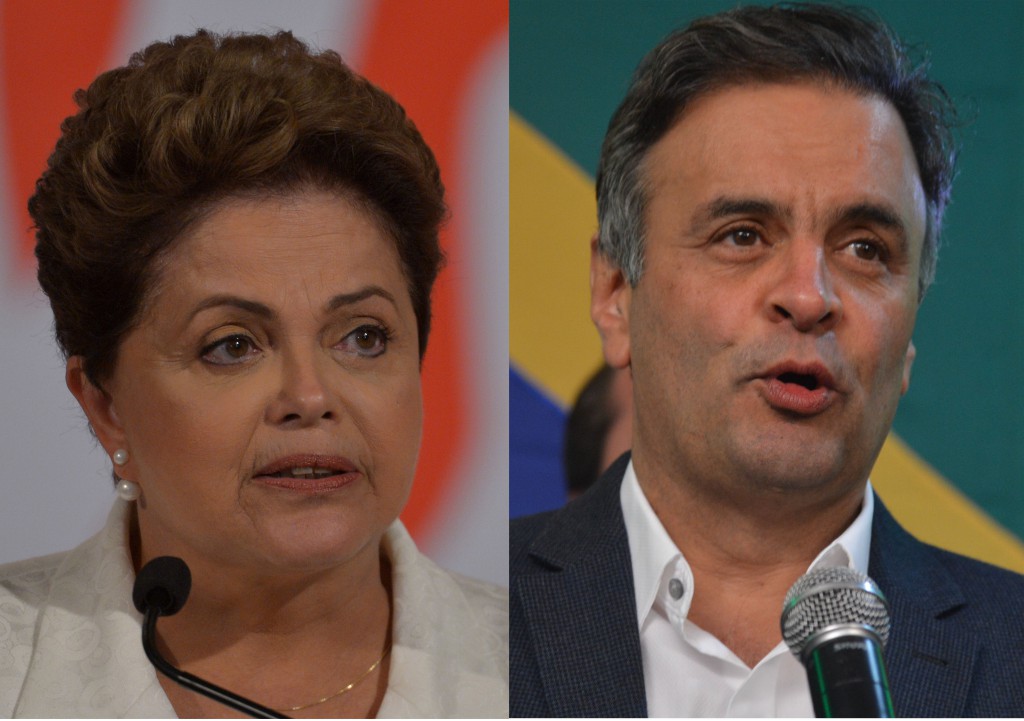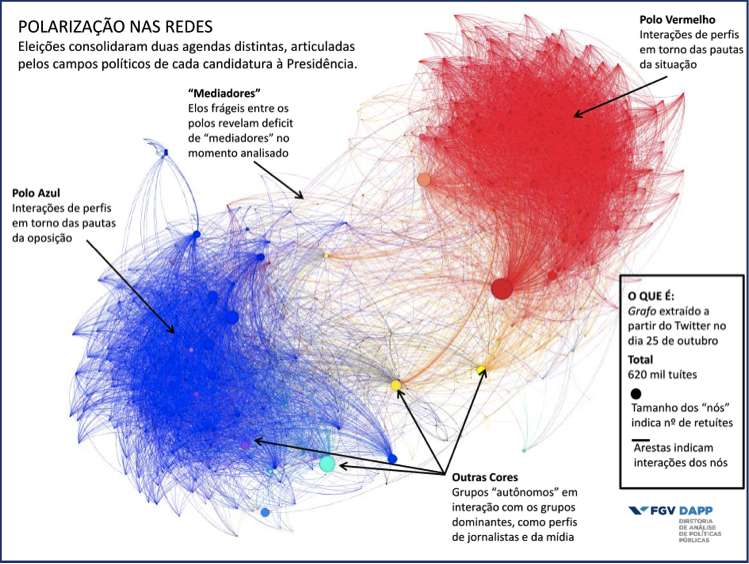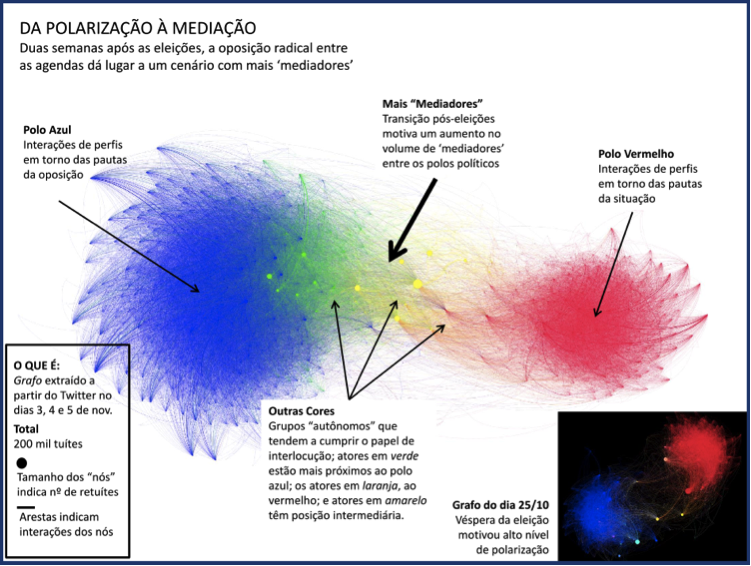Polarization and electoral hangover
by Digital Rights LAC on June 12, 2015
Once past the competitive 2014 elections, the country is going through a delicate moment. On one hand, the new government composition is expected to seek a reconciliation tone, positioning itself in a more moderate way that allows the operation of the coalition government model still in place. On the other, it is already clear that it will be a difficult and painful process due to the intense political polarization – while it indicates distension trends, it remains a significant element in the conduction of Brazilian politics.
By Eduardo Alves Lazzari – Master’s in Political Science (USP) and Researcher at EDSP-FGV & Rodrigo Moura Karolczak – Bachelor in International Relations (PUC-SP) and Researcher at EDSP-FGV
In an interview to BBC, Márcia Cavallari, director of IBOPE (Brazilian Institute of Public Opinion and Statistics), says that these were the most polarized elections since the reestablishment of democracy, with a systematic tie between candidates and a strongly divided country. The latter is expressed mainly in the gap between the electorate in the North and Northeast, as opposed to the South and Southeast.
It is true that we still see reflections of the election period, allowing the hypothesis that, for some analysts, we would be experiencing a hangover from this confrontation. For Timothy Power, Brazilianist director of the Brazilian Studies Program at the University of Oxford, the political polarization focused on the presidential race and did not manifest itself so strongly in other spheres of power. For philosopher Paulo Eduardo Arantes, the political dispute would not represent a sign of a deep division within society.
A good picture for that was the recent episode of hostility against the former Minister of Finance of Brazil, Guido Mantega, at a private hospital in São Paulo. Events such as this were common at an alarming rate during the election period, showing the latent difficulty of coexistence between government supporters and the opposition.
The first hypothesis on the reasons for such high polarization degree soon emerged. Thus, the environment provided by the internet was repeatedly made at least partially accountable for this outlook.
In her brilliant column, Eliane Brum explores that not only evil has been trivialized, but also passed by a gradual process in which people would no longer follow any living rule, expressing their innermost thoughts without any kind of filter or shame, even if absolutely disrespectful.
The internet was supposedly the key element to remove these rules. By allowing people to be part of a debate without any ties or conditioning from its speaker, they supposedly feel free to ridicule, insult and completely discredit the person being criticized. It is true that this argument partly holds on to a perception of immunity, security and power that the internet is able to provide. However, the hypothesis of anonymity has allegedly no basis due to the large volume of people not seeking to protect their identity when expressing their hatred and prejudice.
With such perennial behavior in the main communication vehicle for some people, this conduct quickly propagated to reality – interpreted as the offline sphere. However, the effort that this line of reasoning does to explore the link between virtual and real behavior is very little. If it is true that we had an abundant number of political hostility events, we also must take into consideration that it did not put an end to the embarrassment in the offline world. After all, trivialization and disruption of living standards on this sphere are much more likely to be held accountable or suffer punishment, even if outside the legal framework.
Other possible lines of thinking are trying to investigate the subject from the so-called filter bubble. Made up by different algorithms that dictate the content of social networks, the filter bubble seeks to actively expose the user only to the contents included under his/her interests. Besides, there’s a filter that is set intentionally by the user when he/she chooses to block certain content source.
This is allegedly a more productive line to demonstrate the link between the real and virtual worlds, since the conversion from the online to the offline world is supposedly distorted by the filtered information that the user consumes over the Internet. The distortion of this behavior pattern accepted over the network supposedly distorts the user’s worldview, making it more immune to opposing views.
According to the research on policy monitoring over the network by DAPP FGV, presented on November 2, it is possible to observe clear self-referential political poles on the eve of elections, that is, poles that do not converse much with users of differing opinions. It is precisely this kind of context that supports the increasing intolerance before divergent users.
Before the Internet, individuals with more radical positions were not sure how widespread their preferences were. As they began building up their network of interactions over the Internet, they were able to find a multitude of individuals who shared their vision, reducing the embarrassment felt in expressing their preferences outside the virtual world, that is, these preferences were no longer distorted in accordance with the speaker, because individuals were no longer isolated. For this reason, needless to say, extremist groups increased in size, but they are using digital tools to regroup themselves, capturing the debate and suppressing contributions of more moderate positions. In short, extremist coalitions of society were reformed, producing a centrifugal tendency, difficult to control.
It is worth mentioning how this new pressure is somehow not only threatening to the political debate, as it undermines its foundations, but how little is known to equate it with the centripetal tendency that the so-called “median voter” produces in electoral disputes. That is, a centrifugal dispute in the debate level and a centripetal dispute at the electoral level will inevitably produce friction and conflicts that somehow will have to be solved by any political community.
However, it is also noteworthy that we are moving towards a less pronounced, although present, polarization. Yet, according to a survey by DAPP FGV, the data collected on the network in early November show a growing number of mediators.
In any case, the difficulty lies in going beyond the theories about the causes and effects with which the Internet supposedly have contributed to the polarization. The most immediate problem to be overcome is to attest by the causality between polarization and the internet. In this case, we must first answer whether society is more polarized today than it was before the expansion of the internet. Overcoming this bottleneck is essential. Until then, those interested in the subject are likely to be just speculating.








